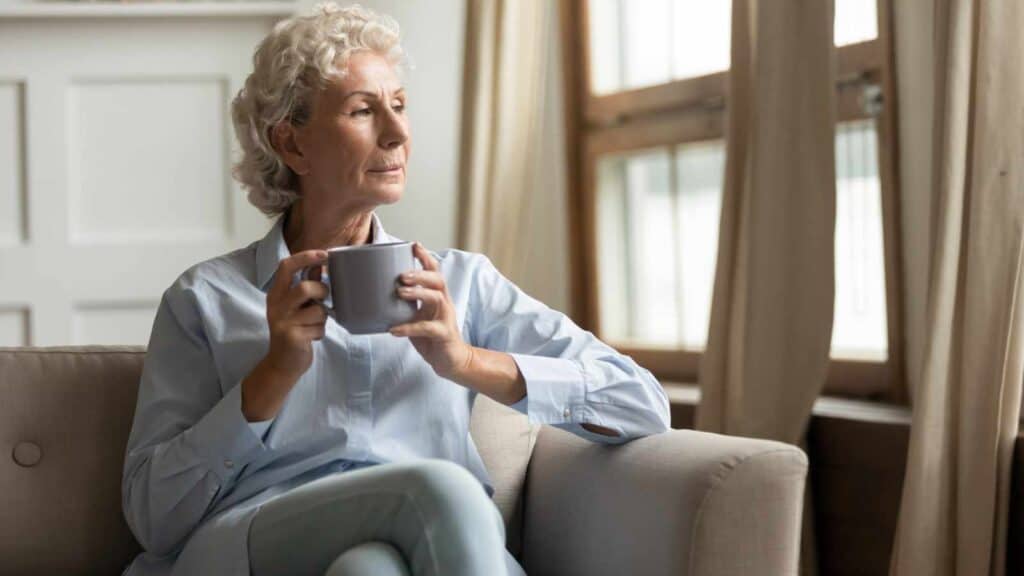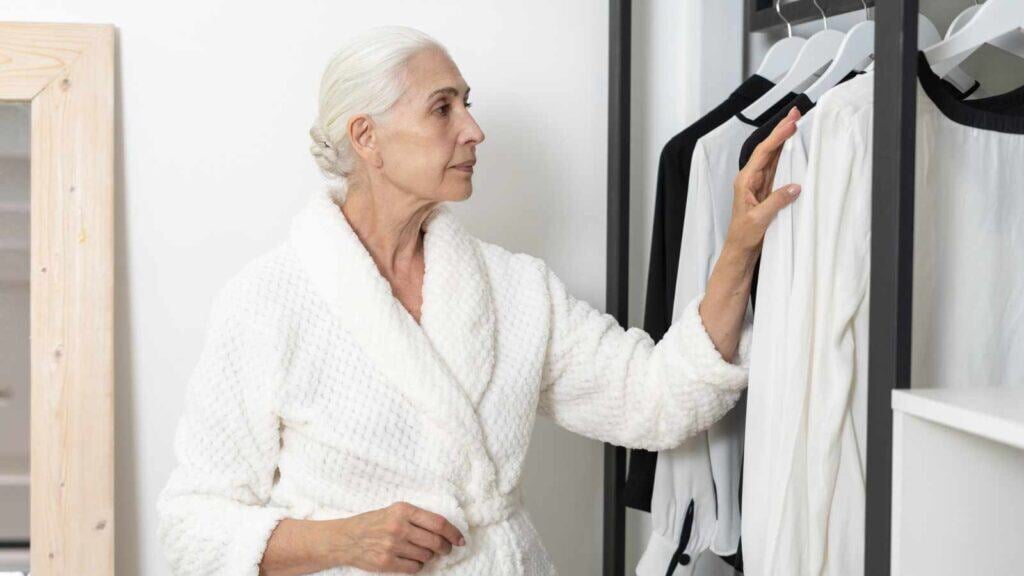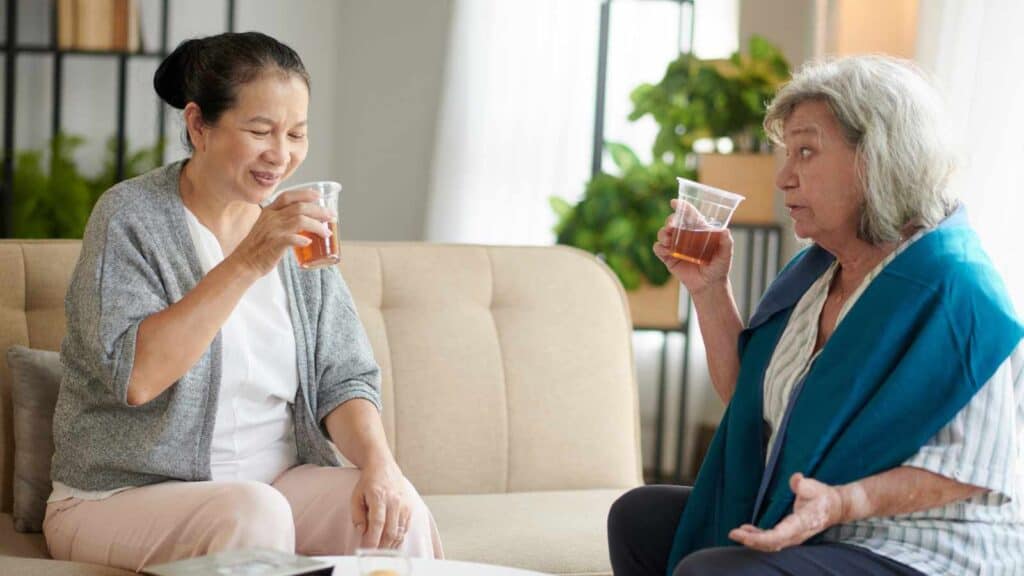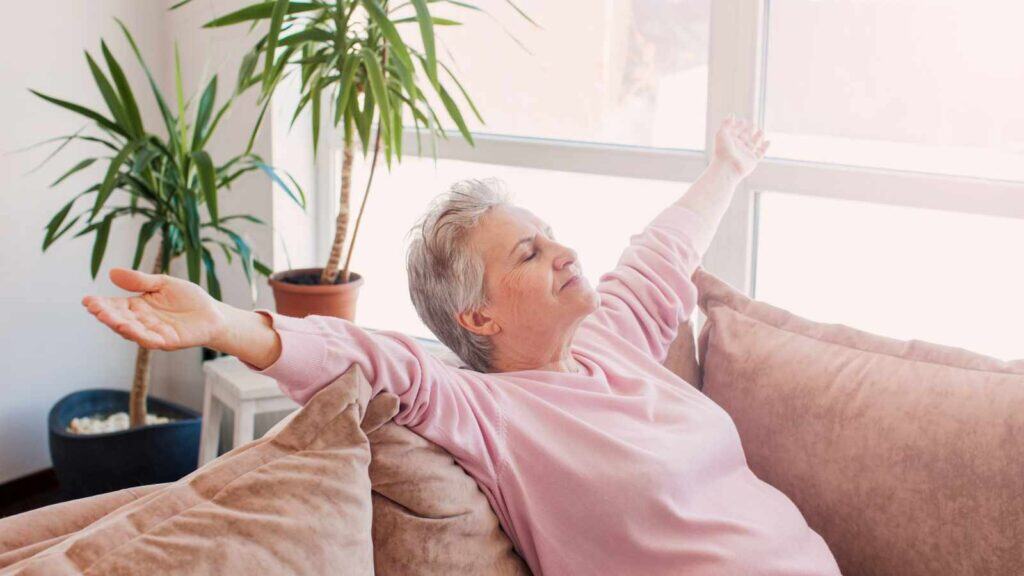11 reasons people tend to stay in more as they get older
Ever notice how your perfect Friday night has slowly morphed from a crowded bar to your own couch?
It’s a shift that happens so gradually you barely see it coming, until one day you realize the thought of putting on “real pants” after 8 p.m. feels like a monumental task. This isn’t just a feeling; it’s a documented trend. Data from time-use surveys in the U.S. show a massive change in how we spend our days as we age. While we spend our youth surrounded by friends and family, by the time the average American reaches 80, their daily time alone rises to almost 8 hours.
But this isn’t a sad story about loneliness. It’s a story about a powerful and frankly, brilliant, reprioritization. This evolution isn’t about becoming boring or antisocial. It’s a natural and smart response driven by profound changes in our psychology, biology, finances, and what we value in life.
Your brain is literally rewiring itself for smaller circles

It’s not just in your head; it’s in your brain. A fascinating German study found that as we get older, the neural networks that govern our social behavior physically change, making a quiet night in feel much more appealing.
Think of it this way: the brain networks involved in memory, attention, and self-awareness—the very things that help you feel sharp, witty, and confident in a bustling social scene—tend to become weaker with age. This can make the mental gymnastics of socializing feel more like a chore than a pleasure.
At the exact same time, another network gets a power-up. The connections in the brain that process bodily sensations and social stress, like feeling judged or excluded, actually grow stronger. The result? Social interaction can start to feel more draining and overwhelming on a purely neurological level.
So, the next time you feel a wave of “I’d rather be home” at a loud party, don’t blame yourself. Your brain is just doing its job, gently nudging you toward environments where you feel more comfortable and less stressed.
You’re trading FOMO for the joy of JOMO
Remember the constant, nagging fear of missing out (FOMO)? Its much calmer, wiser cousin is replacing it: the joy of missing out (JOMO). And this isn’t some niche wellness trend; it’s a full-blown cultural shift.
A 2024 survey revealed that a staggering 81.2% of Americans say they genuinely enjoy deliberately missing out on social events. The reason is simple: it feels good. The same survey found that almost three-quarters of people (72.2%) report feeling a stronger sense of well-being when they decline the RSVP.
Health psychologist Alicia Banderas calls this a “moment of self-awareness,” where we realize that trying to keep up with the curated perfection we see online doesn’t actually make us happy. As we mature, we gain the clarity to decide what we really want.
Honestly, going out is just ridiculously expensive
Let’s be real for a second: your bank account is a huge fan of you staying home. The cost of a “simple” night out has spiraled into something that requires a line item in your monthly budget.
In a city like San Diego, the average night out costs an eye-watering $225.27. Even in the UK, the average is over £73 (about $90). Just think about the math: dinner for two can easily top $80, cocktails are pushing $20 a pop in many cities, and that’s before you factor in surge-priced Ubers that can run you $40-$60 each way.
It’s no wonder that embracing JOMO can save the average American nearly $1,000 a year—and that’s just from skipping one dinner, one movie, and one round of drinks per month. In fact, a Self.inc survey shows that over half of people (55.6%) who choose to miss events do it specifically because of the high costs involved.
Your ‘social battery’ doesn’t hold a charge like it used to
Think of your capacity for socializing like a phone battery. When you’re younger, it seems to have an infinite charge. As you get older, you notice it drains much, much faster. This is the “social battery” concept, and it perfectly explains why you might feel totally wiped after just a couple of hours at a party.
A huge culprit here is modern work culture. With the rise of “work intensification” and “hyperconnectivity,” many of us are expected to be “on” all the time, blurring the lines between our professional and personal lives. A toxic work environment marked by high stress and unreasonable demands can leave you feeling emotionally exhausted before your workday is even technically over.
A drained social battery isn’t just about feeling tired. It comes with real symptoms: you might feel irritable, find it hard to concentrate, have less patience, and feel a powerful urge to just be alone to recharge.
The hassle factor is real, and your decision fatigue is maxed out

Ever found yourself staring into your closet, completely unable to decide what to wear for a night out, and just giving up? That’s decision fatigue, and it’s a very real thing.
Experts estimate that the average person makes over 35,000 decisions a day, from what to eat for breakfast to how to respond to a tricky work email. Your brain’s ability to make good, thoughtful choices literally deteriorates as the day wears on.
Going out involves a long, exhausting chain of decisions: What should we do? Where should we go? Who should we invite? What time? How do we get there? What do I wear?
Staying in eliminates nearly all of that. The decision is made: you’re staying on the couch. When your brain is mentally spent, it defaults to the path of least resistance. And there is no path less resistant than the one from your kitchen to your living room.
Because hangovers past 30 are a two-day commitment
It is not your imagination: hangovers get exponentially worse with age. What used to be a slightly foggy morning you could cure with a greasy breakfast has now become a 48-hour hostage situation where you vow to never drink again.
There’s solid science behind this cruel trick of aging. According to Dr. Krista LaBruzzo, an addiction medicine specialist, two key things are working against you.
First, your metabolism slows down. Your liver produces fewer of the enzymes needed to process alcohol, which means the booze lingers in your system longer. This makes you feel its effects more intensely and for a longer period.
Second, your body’s overall water content decreases as you get older. This means any alcohol you drink is less diluted, leading to a higher blood alcohol concentration from the same number of drinks. This dehydration is a primary driver of those skull-pounding hangover headaches. The return on investment for a night of drinking simply plummets.
Your home is now a five-star entertainment hub
Why would you go to a crowded, sticky-floored movie theater when you have a better setup in your own living room?
We’re talking about breathtaking 8K televisions, immersive Dolby Atmos sound systems that make you feel like you’re in the action, and a limitless library of content from services like Netflix, Disney+, and more.
The quality of the home experience now frequently surpasses what you can get out in public. Plus, at home, you control the volume, the pause button, the snack selection, and, most importantly, the company. Staying in is no longer the second-best option; it’s often the premium choice.
You start prioritizing deep connections over crowded rooms

As you get older, you naturally shift from collecting acquaintances to investing in true friends. It’s a deliberate and intelligent move from quantity to quality.
Psychologists have a name for this: Socioemotional Selectivity Theory (SST). It may sound complicated, but the idea is simple. As we get older and perceive that we have less time ahead of us, our motivational goals change. We stop focusing on long-term goals like expanding our professional network and start prioritizing things that bring us emotional satisfaction right now.
According to the theory, older adults actively “restructure their social networks to reduce contact with peripheral or less close social partners.” Instead, they pour their limited social energy into meaningful and rewarding relationships with close friends and family who truly matter.
This means you’d much rather have one deep, authentic conversation with a best friend on your couch than try to shout small talk with 20 people you barely know at a loud bar. It’s not about being less social; it’s about being more selective with your precious social energy.
Life’s responsibilities just leave you drained
Let’s be honest, between a demanding career, raising children, managing a household, and maybe caring for aging parents, where is the energy to go out?
The American Time Use Survey paints a clear picture of this reality. Adults living with children under age 6 spend an average of 2.5 hours per day on primary childcare alone. And that doesn’t even count “secondary childcare,” which is all the time a child is in your care while you’re trying to do other things, like cook or clean. Additionally, the average person spends approximately two hours a day on household activities.
It’s no wonder that adults aged 35 to 44—smack in the middle of peak career and family-building years—report having the least amount of leisure time, averaging just 3.8 hours per day.
When you finally get a moment of freedom, the last thing on your mind is rushing out the door. You just want to sit down. For many, staying in isn’t just a preference; it’s a logistical necessity.
You’ve become much more sensitive to noise and overstimulation
Loud music, crowded rooms, multiple conversations happening at once—what once felt exciting and energizing can now feel like a full-on sensory assault.
This feeling is known as overstimulation. It’s what happens when your brain is bombarded with too much input at once and simply can’t process it all. The result? You can feel anxious, irritable, restless, and utterly drained.
As we get older, our tolerance for this kind of sensory chaos often plummets. We begin to crave environments that we can control.
Your home is the ultimate controlled environment. You set the volume. You control the lighting. You decide on the guest list. It becomes a sanctuary, a safe haven from the unpredictable and often overwhelming sensory overload of the outside world.
Comfort becomes your number one priority

Let’s end with the simplest, most undeniable truth of all: your couch is just more comfortable than a wobbly barstool.
This isn’t just a preference; it’s also physiological. Our bodies change as we age. Bones can lose density, and muscles tend to lose some of their strength, endurance, and flexibility. Standing for hours at a concert or squeezing into a tight restaurant booth simply loses its appeal.
Our cardiovascular system also evolves. Arteries can become stiffer, which makes the heart work harder to pump blood. The motivation to push through physical discomfort for a social event you’re not even that excited about dwindles rapidly.
Ultimately, the profound and simple pleasure of being in your own space, with your own things, wearing your most comfortable clothes, becomes one of life’s greatest luxuries. It’s not about giving up; it’s about graduating to a new level of prioritizing your own well-being and comfort.
Key Takeaway
Staying in more as you get older isn’t a sign of decline; it’s a sign of evolution. It’s a smart, deliberate shift toward prioritizing what truly enriches your life: financial well-being, genuine connections, mental peace, and physical comfort. You’re not missing out; you’re just getting better at curating a life that actually feels good on your own terms.
16 Best Jobs for Pregnant Women

16 Best Jobs for Pregnant Women
Pregnancy is a transformative and joyous period in a woman’s life, but it comes with unique challenges and demands. One of the most crucial aspects during this time is ensuring a healthy work-life balance.
Finding the right job during pregnancy is not just about earning an income; it’s about maintaining your health, well-being, and peace of mind.







